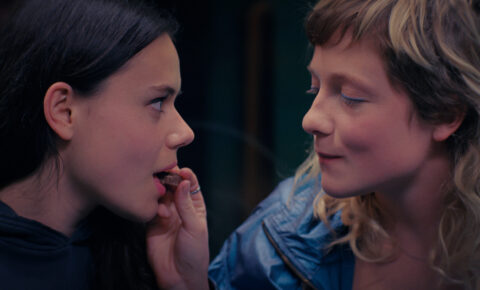The Letterboxd synopsis for Claire Burger’s extremely messy but super engrossing Competition drama Foreign Language (2024) is perhaps the understatement of the year.
It’s described as:
“Teenage pen pals in France and Germany forge a friendship through letters, exploring cultural differences and improving their foreign language skills.”
OK yeah, sort of, but it’s more of a queer-ish coming-of-age drama that goes off the rails with numerous tangents involving leftist European politics, family secrets, alcoholism, sensual chocolate magic mushrooms, graphic teenage sex (with toe sucking in a jacuzzi) and an increasingly tangled web of lies involving multiple parties.
Burger’s film may not be as violent, provocative or visually captivating as the other big sapphic Berlinale jam this year (Love Lies Bleeding, Rose Glass, 2024), but it certainly comes close to being just as unhinged, treading dangerously close to camp territory in its second hour. There’s plenty of human warmth and natural performances, but its political content feels like it was designed specifically to get that sweet European film funding.
The first act goes hard with an engaging setup that also serves as a vehicle to later comment on the historic Franco-German partnership. (Some jokes and references land better than others). Members of a school exchange program, the sullen and shy French gal Fanny (Lilith Grasmug) arrives at her German pen pal’s house to find an unpleasant situation.
Lena (Josefa Heinsius) lives with her alcoholic mother (the always-excellent Nina Hoss) and doesn’t want to spend any time with her. Feeling homesick, Fanny calls her mom back in France, and we get our first sense that something’s amiss in her life. A few beats later, the girls are opening up and a sensual friendship blooms.
A lot of this works, especially in the first half, but things get far too chaotic. The main problems are the self-conscious political dialogue and convoluted plotting.
Whenever the film tries to tackle regional politics, like when Lena’s racist, AfD-voting grandfather comes to visit, it just comes off as way too topical and on the nose. Meanwhile, the plot begins to fall apart under the weight of its many moving parts, becoming too heavy with duelling themes and too many new reveals.
Instead of sticking to the first hour’s structure (combining queer teenage romance with a political context), the movie loads itself with new and unnecessary sub-plots involving the parents that only complicate things in a distracting and disjointed way. Most of the characters are lying about something, or delusional about something — and that can certainly make for an interesting film — but things quickly spiral out of control.
On a positive note, portrayals of young European leftists often come off as forced, like in Julia von Heinz’s 2020 film And Tomorrow the Entire World. Burger shows plenty of restraint in this department. Apart from a punky haircut and a patch on her bag about fighting the patriarchy, Lena looks like your average cool teenager who just happens to hate fascists. Heinsius, in her film debut, is superb — the role calls for her to be snarky and difficult early on, and then slowly let her guard down. Burger might indulge in some cliched Black bloc riot sequences — you know the vibe: masked leftists throwing shit at cops and eventually being hauled away — but she doesn’t totally overdo it.
The Fanny character reminds me of that episode in the third season of Curb Your Enthusiasm (Larry David, 2000-) in which Richard Lewis tries to take credit for coining the term “the (blank) from hell” — for example, the date from hell or the vacation from hell. Audiences in the late 80s/early 90s loved this trope — films like The Hand That Rocks the Cradle (Curtis Hanson, 1992) (the nanny from hell), Fatal Attraction (Adrian Lyne, 1987) (the one night stand from hell), Pacific Heights (John Schlesinger, 1990) (the renter from hell) were ubiquitous. Burger’s film joins this prolific club with the teenage penpal from hell. Foreign Language bears no tonal resemblance to any of those films — it’s not a thriller at all — but the level of chaos Fanny brings into Lena’s already dysfunctional life is hard to empathise with, which we’re definitely meant to do.
In the end, the film rewards a bunch of questionable behaviour from everyone. We’re left with muddled messages about love, politics and our messy relationship with “the truth”… whatever that is.
Jared loves movies and lives with Kiki in Berlin.
